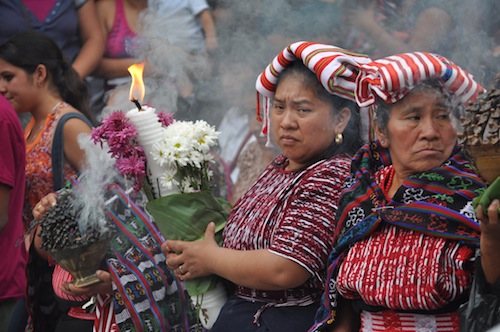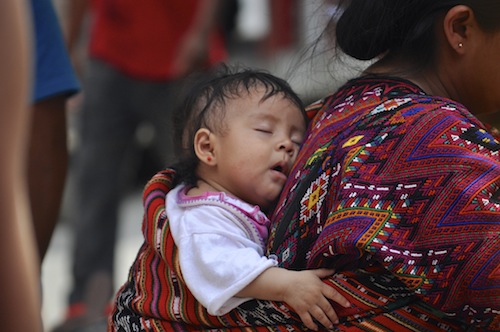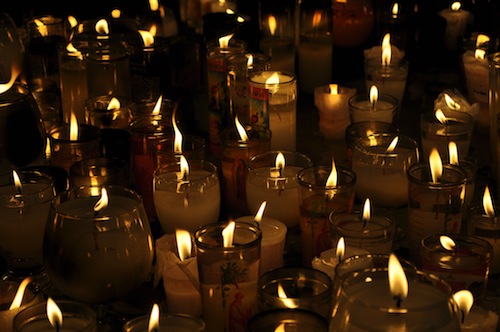Is there really such a thing as “us” and “them”?
As we travel around the world, one of our most important goals is to connect with people and find out what common threads exist that bind humanity together. It is so very easy to categorize people and to explain away the worlds ills with generalizations and dinner table chats on politics.
But who are the individuals who inhabit our earth? Who are the people we talk about dismissively during those dinner table chats, sandwiched somewhere between the main course and dessert? How are they affected by the grander conflicts of our world? What do we have in common with them?
Does the key to changing our worst behaviors as a species lie solely in seeing people as individuals who are very much like us?
Recently, I had the honor of meeting a woman named “Katerina”, who chose to share her experiences during a very dark period in Guatemala history- a period many have categorized as genocide. Her experience is her own and her perspective is uniquely hers, though many suffered in a similar fashion.
The period in Guatemalan history Katerina talks about is very recent history. It was a period of brutality fueled by politics that affected the lives of every Mayan, every Guatemalan, at the time. Out of sheer panic over the possible spread of Communism, the US played a now well-known role in the events during this period, supporting a brutal regime and fueling anti-indigenous sentiment in the country. Guerrilla groups cropped up (some backed by Cuba) and, in their zeal to fight brutality from government backed groups, often tormented the local populace in their own right. The results were catastrophic with hundreds of thousands of people killed or “disappeared” and many more tortured and brutalized.
I was barely alive when this all took place but, as an American, I cannot help but feel remorse and utter helplessness over the horrific experiences Guatemalans were forced to endure due in part to my country’s politics.
Katerina said, in part:
“They would come in the night. They would burn buildings and start fights. No one had arms to protect themselves but they would still come. They would kill men, women, and children- they didn’t care. It didn’t matter if they were guerrillas or military, they were all the same.
My family was one of the lucky ones. There were police in disguise all over our village but my family had no one with the guerrillas so we escaped much of the problems. People where I lived were always afraid. The military was always demanding free food that we could not afford to give. They would rape our women; kill people as they went about their daily lives. My mother protected us fiercely and somehow, none of the females in my family was ever raped. The guerrillas were always causing problems and they were not much better than the military and police officials.”
Can you imagine what she is saying for a moment? Close your eyes and imagine strangers coming in the night and killing your child. Now imagine those strangers are dressed in the military uniform of your own country. Imagine that the greatest achievement you reach as a mother for over a decade was in protecting your girl children from being raped. Imagine, on top of all of this, that you have absolutely no idea what is going on.
“In Chichicastenango, there were military and guerrillas everywhere. No one knew where these people were from, they were strangers. The guerrillas dressed in the typical, local clothing of the Mayan people in Chichi and so the military was constantly coming after the Chichi people. But these guerrillas were not from Chichi, they were strangers who dressed like the Chichi people to fool the military. No one in Chichi knew who they were. It was very dangerous for the local people.
In the time of the guerrillas, there were still a few foreigners coming in and out of Guatemala. A friend used to drive these foreigners from Guatemala City to the Panajachel area. Along the highway between Guatemala City and Pana, you can often see sacks filled with crops, lining the side of the road, waiting for pick-up. One time when this friend was driving these foreigners, there was a stretch of road that had sacks upon sacks but there was not one single person around. The foreigners asked the driver what was in those sacks because there were just so many and the driver told them it was likely potatoes.
They dropped these foreigners off in Panajachel and turned around to head back to the city. On their return, they noticed the sacks were still there. They went on for what seemed like kilometers. The driver’s helper convinced the driver to pull over and see what was in those sacks. There were just too many and there was still not one single person in sight. When the driver pulled over, he opened the bags and discovered the heads of indigenous people stuffed into those sacks. Who knows what happened to the rest of the bodies of those people.
Why would anyone do this? It was political. It was always political. We had no freedom of expression. We were stuck in the middle of violence that wasn’t ours. It’s always the same but now the problems we see are different. There are really no more guerrillas now but extortion is a very real problem these days. But it’s always political.”
Why would anyone do this? How could they do this to fellow human beings? Simple. They stopped thinking of Katerina and her community as human. The perpetrators created a political problem, a threatening philosophy that happened to wear indigenous Mayan clothing. Katerina and her community became “collateral damage”. Today that political problem wears a turban and has a beard. Collateral damage still exists and lately, it seems to exist far too often at Middle Eastern weddings full of children and families.
I wonder sometimes what clothing our political problem will wear tomorrow? Who knows.
“The guerrillas and the military were all the same to us. They all wanted something, they all did bad things. The military would tell us we had to have documents [identification] an then the guerrillas would come and tell us “no documents!” They were always fighting. They decimated us financially. We are still struggling to support our families after all the fighting. We work harder to earn [the equivalent of] one dollar. Kids to take care of, no land, no work. When you live like this, you end up with no love for life.”
When you sit sit across the table from a woman like Katerina, sharing a warm empanada, and listening to her story, it is hard to view her, or her community, as anything but human. They are not a political talking point, they represent no ideology. Katerina, her family, and her friends are people. People who woke up one day to torture, rape, violence, murder, kidnappings, and abuse around every corner.
Travel brought me to Katerina’s table and her face is the face I will always imagine when I here the words “those people” fall off the lips of someone discussing politics at a dinner party. Those people have names, faces, feelings, and terrifying fears because of political ideologies. We create enemies, reasons to wage war, and imaginary barriers that divide humanity into “us” and “them”.
But there is no “us” and “them”. The very concept is an illusion.
Katerina is, at her core, absolutely no different than me. There is nothing at all stopping the horrors she faced from showing up on my doorstep tomorrow….. or yours.
Travel creates space for clarity. It pulls away the curtain of political ideologies and forces us to think for ourselves instead of internalizing the agenda of our next “leader”.
It creates the space to see our own hypocrisy and to see the simple facts in those situations we make far too complex, in a never ending search for justification.
Travel forces us to look “them” in the eye to see if our justifications, political talking points, philosophies, and biases hold up.
It creates the conditions where a citizen of, arguably, the most powerful country (currently) on earth can sit across the table from a descendant of one of the most powerful civilizations in history and discuss the very simple fact that there is absolutely no difference between human beings- no matter what corner of the earth they call home or what period of history their society inhabits.
When our common humanity is illuminated and we accept that there is no “us” and “them”, it becomes impossible to ignore the “collateral damage” anymore.
“Me, I am lucky. I like my work. I work everyday between my two jobs and I get one day off every 15 days. I don’t drink, not at all, for 9 years. My kids, my spouse, and my family are more important to me. But what about the others? They work in ways they weren’t meant to for money they do not care about. The kids are forgetting our culture. They drink to feel better. What about them?
We still have problems after what happened.”
Yes. We certainly do.




Category: Central America, Ethical Travel